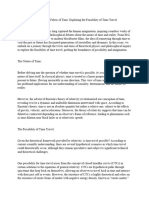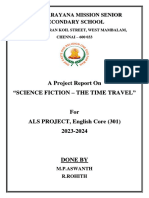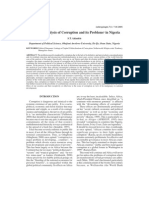0% found this document useful (0 votes)
25 views7 pagesInvestigation Project
The document explores the concept of time travel, defining it as the hypothetical ability to move between different points in time and discussing its historical, scientific, and ethical implications. It examines scientific theories such as relativity, wormholes, and quantum mechanics, as well as paradoxes like the grandfather and bootstrap paradoxes that challenge our understanding of causality. The conclusion emphasizes the ongoing dialogue between science, philosophy, and culture regarding the complexities of time.
Uploaded by
abinashjohn20Copyright
© © All Rights Reserved
We take content rights seriously. If you suspect this is your content, claim it here.
Available Formats
Download as DOCX, PDF, TXT or read online on Scribd
0% found this document useful (0 votes)
25 views7 pagesInvestigation Project
The document explores the concept of time travel, defining it as the hypothetical ability to move between different points in time and discussing its historical, scientific, and ethical implications. It examines scientific theories such as relativity, wormholes, and quantum mechanics, as well as paradoxes like the grandfather and bootstrap paradoxes that challenge our understanding of causality. The conclusion emphasizes the ongoing dialogue between science, philosophy, and culture regarding the complexities of time.
Uploaded by
abinashjohn20Copyright
© © All Rights Reserved
We take content rights seriously. If you suspect this is your content, claim it here.
Available Formats
Download as DOCX, PDF, TXT or read online on Scribd
/ 7























































































